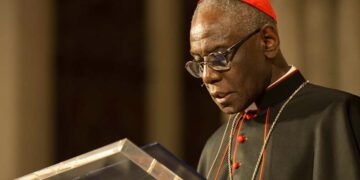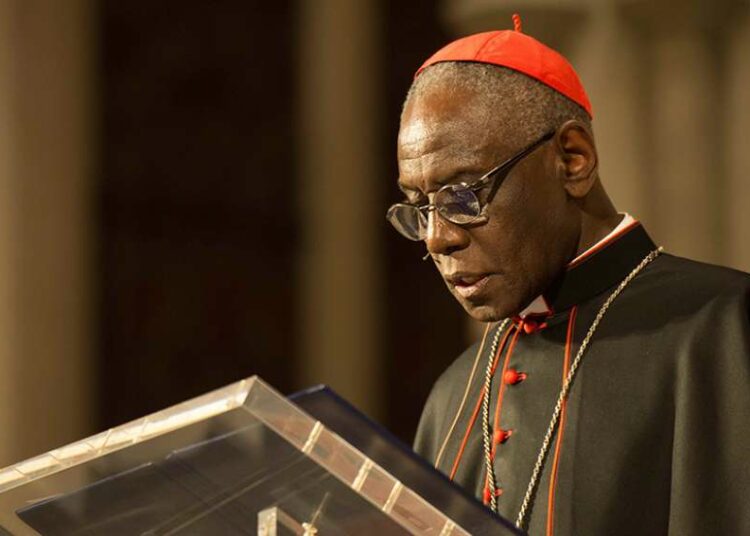Cardinal Robert Sarah is no stranger to religious persecution. This highly venerated champion of faith and freedom—who has served the Catholic Church in such notable positions as secretary of the Congregation for the Evangelization of Peoples, president of the Pontifical Council Cor Unum (responsible for Catholic relief efforts worldwide), and president of the Pontifical Council for Justice and Peace—grew up in the West African nation of Guinea, where he was inspired by the priests who endured great hardship to bring the Catholic faith to his remote village and convert his family.
Feeling called to the ministry, he entered seminary at age 12, but was soon forced to leave his homeland in order to continue his studies when the Guinean government expropriated Church property.
He was an exceptional student, eventually mastering French, English, and Italian, and earning licentiates from the Pontifical Gregorian University in Rome and the Studium Biblicum Franciscanum of Jerusalem. At the age of 34 he became the youngest Bishop in the Catholic Church when he was appointed Archbishop of Conakry, Guinea, succeeding a man who had been imprisoned for years by the Marxist government.
The new Archbishop soon found himself in danger when he was targeted for assassination by Guinean dictator Ahmed Sékou Touré. But as reported by the French newspaper Le Figaro, Archbishop Sarah “did not hesitate to oppose the all-powerful [dictator], then ‘supreme leader of the revolution’ [and] also a commander of violent repressions.”
The Historical Dictionary of Guinea called Archbishop Sarah “one of the most respected leaders among Guineans, who expressed their strong desire to see him lead the country’s political transition on various occasions between 2006 and 2010. He arguably earned much of this popular trust by speaking truth to power during the stormiest years of President Touré’s regime, while other spiritual leaders endeavored to cater to the regime.”
Later made a cardinal, he continues even now at the advanced age of 77 to speak truth to power, as he did recently in an interview with EWTN news. “Threats against religious liberty take many forms” as “countless martyrs continue to die for the faith around the world,” Cardinal Sarah declared. “But religious liberty is under threat in the West, too,” due to an “implicit bias against Christianity.”
And while it is true, he explained, that “liberal democracy requires debate,” yet “never can the importance of our worship of God be forgotten or neglected in the course of debate. Liberal democracy must not forget God,” for all have need “to turn to God every day, not just for consolation amid worldly adversities, but because we depend upon him entirely in the cosmic struggle. We are all at war, whether we recognize it or not. It is good that all of us should become aware of that fact and make sure every day that we fight on the side of God.”
Accordingly, “Religious liberty is not to be taken for granted, or compromised, or neglected.” Cardinal Sarah’s timely warning to the West is the voice of experience, the voice of wisdom, and the voice of courage. We ignore it only at our peril.




















Discussion about this post